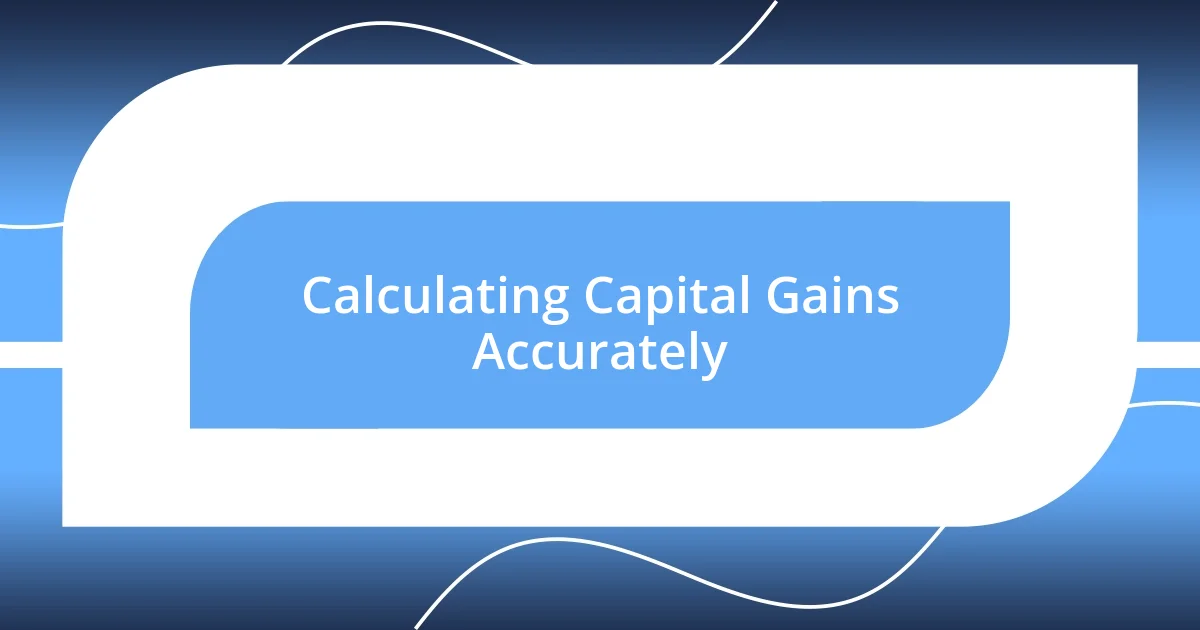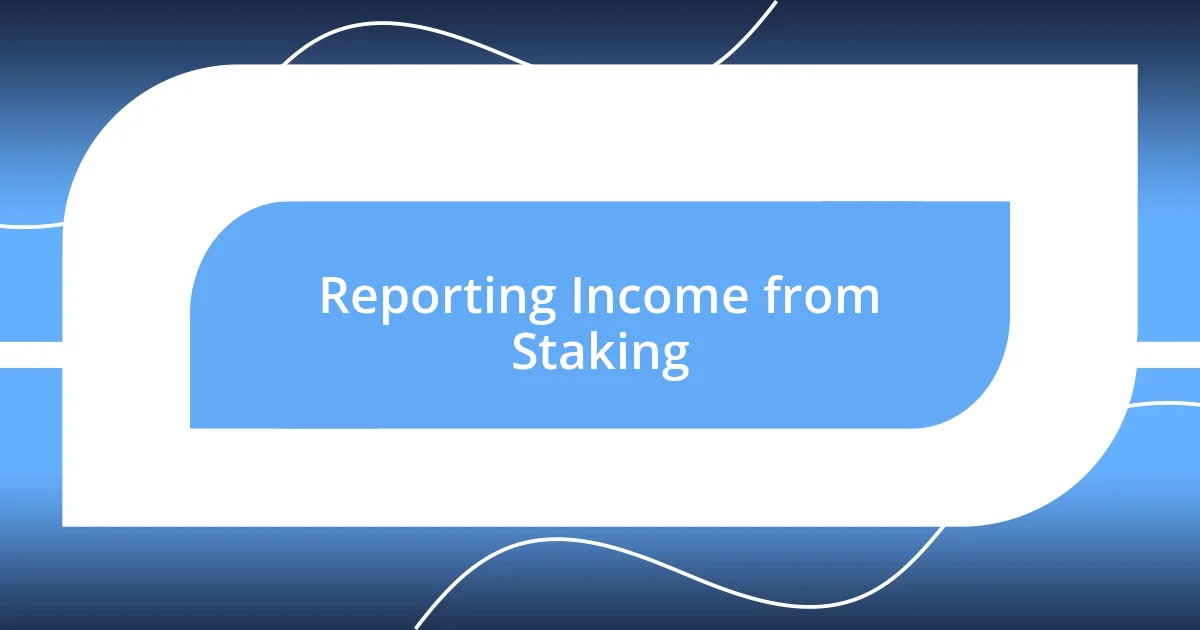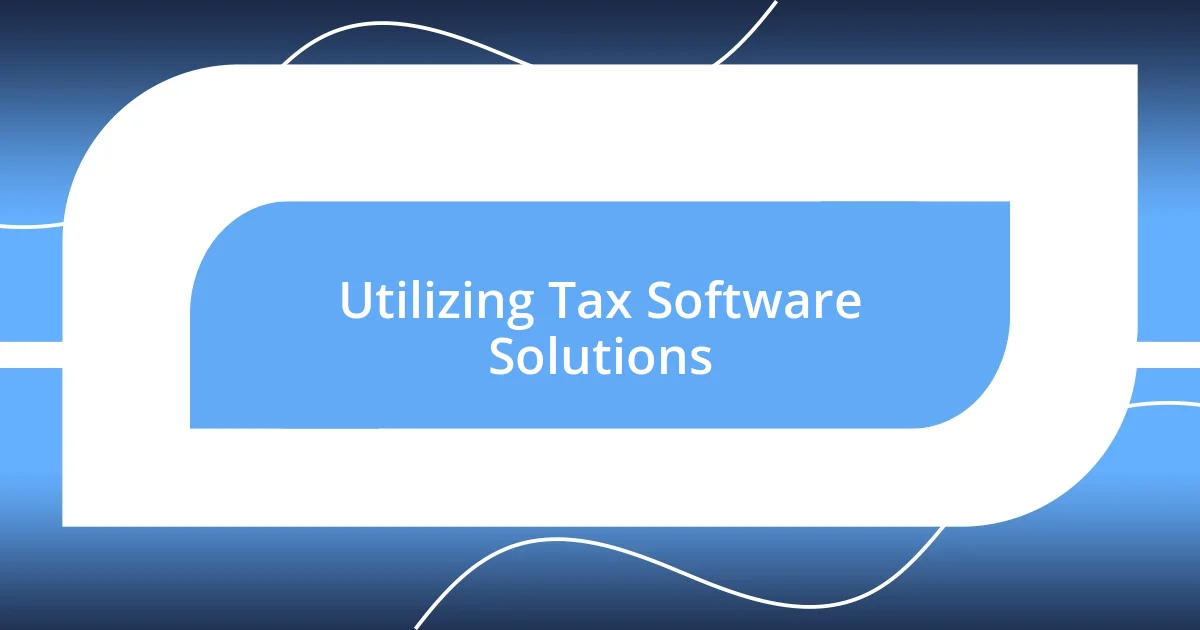Key takeaways:
- Cryptocurrencies are classified as property by the IRS, making every sale or trade a taxable event, with capital gains taxes dependent on holding periods.
- Maintaining detailed records of all transactions and utilizing tracking tools can significantly ease the burden of calculating taxes and managing crypto investments.
- Being proactive about tax implications, staying informed on regulations, and consulting with tax professionals can help minimize tax liabilities and enhance investment strategies.

Understanding Crypto Tax Basics
When it comes to crypto taxes, the fundamental concept to grasp is that cryptocurrencies are classified as property by the IRS. This means every time you sell or trade crypto, you’re engaging in a taxable event. I remember the first time I realized this; I was shocked at how quickly a casual investment could turn into a tax liability. How many other people out there have been caught off guard by this regulation?
As I navigated my own tax journey, I discovered that capital gains play a crucial role. Basically, if you hold onto your crypto for over a year before selling, you may benefit from lower long-term capital gains rates. I personally try to plan my trades around this timeframe, but it takes discipline. Have you ever thought about how waiting could potentially save you money?
Another important aspect is keeping detailed records. I know, it sounds tedious, but trust me, maintaining accurate transaction logs can save you from headaches during tax season. I learned this the hard way when I faced questions about my own record-keeping, feeling that familiar rush of urgency as deadlines approached. How do you track your transactions? Setting up a system early on can make all the difference when you sit down to file your taxes.

Keeping Track of Trades
Keeping track of trades is essential in managing tax implications for your crypto investments. I’ve found that using a combination of spreadsheets and specialized tracking software has worked wonders for me. The first time I used software, I felt an immense wave of relief wash over me—no more lost receipts or confusion about when I bought a coin. Having everything organized in one place not only alleviates stress but also provides clarity during tax season.
Here are some tips that have helped me stay on top of my trades:
- Record Every Transaction: I write down every buy, sell, trade, and transfer. This detail pays off when calculating gains or losses.
- Use Tracking Tools: Investing in a reputable crypto tracking tool can automate much of the grunt work.
- Categorize Your Coins: I like to sort my crypto into various categories, such as long-term holding, active trading, or staking rewards, to better understand my portfolio.
- Keep Exchange Reports: Many exchanges provide annual summaries, and I always download these as they can simplify my record-keeping significantly.
- Regular Updates: I set reminders to update my records regularly to avoid a last-minute scramble come tax time.
By implementing these strategies, I’ve made the tracking process feel a lot less daunting, and I encourage everyone to take the time to find a system that feels right for them.

Calculating Capital Gains Accurately
Calculating capital gains accurately can feel like navigating a maze; however, it becomes manageable with a focused approach. I remember struggling with the math behind capital gains calculations after a few successful trades. To ensure accuracy, I’ve learned to clearly define my holding period—every transaction should reflect whether it’s a short-term or long-term gain, impacting my tax rate significantly. Has this been a challenge for you?
One of my go-to methods is using a simple formula: Gain = Selling Price – Purchase Price. This straightforward calculation sheds light on my gains or losses. At first, I found myself tangled up in exchanges and numbers, but now, I regularly review each trade in a spreadsheet, reminding myself of the potential tax consequences before making my next move. I find that understanding that each trade impacts my overall tax situation keeps me mindful in my investment decisions.
Here’s a quick comparison to clarify how different holding periods affect capital gains:
| Holding Period | Capital Gains Tax Rate |
|---|---|
| Short-term (1 year or less) | Ordinary income tax rates (up to 37%) |
| Long-term (over 1 year) | Lower tax rates (0%, 15%, or 20% depending on income) |
Understanding these nuances has transformed how I approach my investments and taxes. What insights have you gained from your experiences with capital gains?

Reporting Income from Staking
Reporting income from staking can be a bit of a puzzle, and I’ve faced my fair share of challenges with it. When I first started staking, the idea of reporting those rewards felt overwhelming. I recall a moment of sheer confusion when I realized these earnings were considered taxable income immediately upon receipt. That realization made me rethink how I approached my staking strategy.
I’ve discovered that keeping accurate records of my staking rewards has been crucial. I make it a point to note the fair market value of the tokens at the time I received them. This straightforward practice helps when entering my income on tax forms. Have you ever found yourself lost in the details? I know I did early on, and establishing a clear system for tracking when and how much I received in staking rewards was a game changer.
Additionally, understanding the tax implications of staking has allowed me to strategize better. I once received a substantial reward but wasn’t prepared for the tax hit that followed. Being proactive about my tax liability now ensures that I’m not caught off guard. It’s all about staying informed and organized—what strategies have you found helpful in managing your crypto income?

Deducting Relevant Expenses
Deducting relevant expenses can significantly alleviate the tax burden on my cryptocurrency activities. I vividly remember when I realized that certain costs, like transaction fees and the software I used for trading, could be deducted from my overall earnings. This revelation was like a light bulb moment for me—it made my profit-and-loss calculations much more favorable. Isn’t it satisfying to find ways to reduce what you owe?
I’ve also learned to keep meticulous records of all expenses associated with my crypto investments. For example, when I bought mining equipment, I had no idea these costs were deductible. I documented everything from hardware to electricity bills, ensuring I could maximize my deductions. Have you kept track of related expenses? It can feel like a hassle, but it pays off when tax season rolls around.
One time, I overlooked a significant business expense related to a failed project and only realized it after filing. The frustration of missing out on a potential deduction motivated me to adopt a more organized approach. I now use a budgeting tool that categorizes my crypto-related costs, making it easier to spot potential deductions. Have you devised any systems that have helped you capture all relevant expenses? It’s all about creating a structure that simplifies the process.

Utilizing Tax Software Solutions
Utilizing tax software solutions has truly transformed how I manage my crypto taxes. When I first dipped my toes into the world of cryptocurrency, I quickly discovered that manually tracking trades and calculating gains was overwhelming. That’s when I decided to invest in dedicated tax software. I remember feeling a wave of relief when I saw how it could automatically import my trading data from exchanges. Have you ever wished for a magic wand to simplify your financial record-keeping? That’s precisely what tax software feels like to me.
One of the perks I appreciate about these tools is the ability to generate comprehensive reports. I find it incredibly satisfying to see my taxable events neatly organized for easy reference. There was a time when I spent hours piecing together spreadsheets, and the thought of making an error haunted me. Now, with software that does the heavy lifting, I can focus on my investments rather than drowning in a sea of data. Isn’t it comforting to have that peace of mind, knowing that your records are accurate and up-to-date?
Moreover, most of these solutions come with great customer support and educational resources. I recall a moment of panic when I was about to file my taxes, and something didn’t seem correct. I reached out to customer support, and their patient guidance made all the difference. Knowing help is just a click away adds an invaluable layer of reassurance. So, have you considered how tax software might simplify your life? I can confidently say it’s worth exploring, especially if you want to gain control over your crypto tax process.

Planning for Future Tax Changes
Planning for future tax changes requires a forward-thinking mindset. I remember when the IRS introduced evolving regulations on cryptocurrencies, and it felt like a rollercoaster ride. It hit me that staying informed was key. Are you keeping an eye on potential tax policies that might impact your investments? I’ve found that subscribing to newsletters or following tax professionals on social media helps me stay ahead of the game.
As I ponder future tax implications, I occasionally revisit my investment strategies. For instance, when I learned about the possible capital gains tax adjustments, I decided to reevaluate my holding periods. Did you know that holding assets for over a year can lead to lower tax rates in some cases? This realization prompted me to change my approach, allowing me to minimize taxes while maximizing potential gains. How proactive are you in planning your crypto investments with tax implications in mind?
Looking back, I recall a year when I was caught off guard by sudden changes in tax reporting requirements. It taught me the value of maintaining flexibility in my strategies. Now, I regularly consult with a tax advisor to ensure I’m prepared for whatever changes might come my way. Have you thought about collaborating with a professional for guidance? It can be a game changer for navigating the complex world of crypto taxes.













